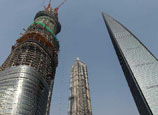
HONG KONG, Dec. 10 (Xinhua) -- Hong Kong Monetary Authority Chief Executive Norman Chan said Monday that if the process of deleveraging is disrupted by quantitative easing, asset prices might drop sharply and remain volatile.
When delivering a speech entitled the Global Deleveraging: The Right Track at the Hong Kong Economic Summit 2013, Chan said that excessive leveraging, or over-borrowing, in major industrialized countries was the root cause of both the global financial crisis and the more recent sovereign debt crisis plaguing Europe.
Chan said quantitative easing is not a panacea, but it is the exact opposite of deleveraging. In the past three years, quantitative easing had limited stimulating effect on the real economy. "In order to solve the structural imbalances built up in the past two decades, we must get to the bottom of the problem."
There is a possibility that quantitative easing produces the desired results, which is a very desirable scenario as global economy will return to its normal growth path, he noted.
However, there is a possibility that the process of deleveraging is disrupted by quantitative easing, leading to sharp increases in asset prices in the first place. Yet, since such increases are not supported by economic fundamentals, any increase in wealth will be seen as transient.
 |














 Cumquat market in S China's Guangxi
Cumquat market in S China's Guangxi


![]()
